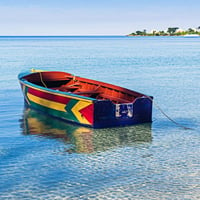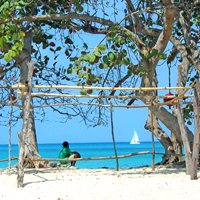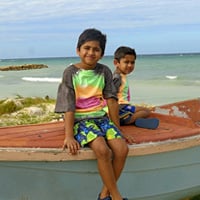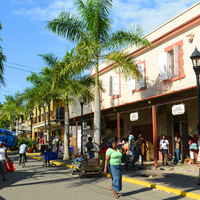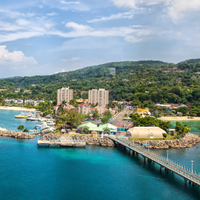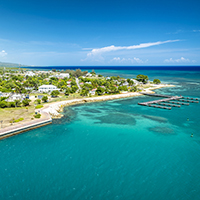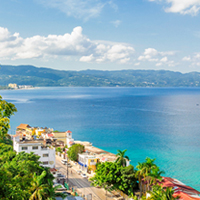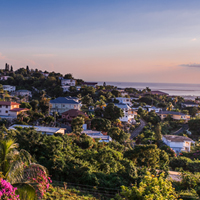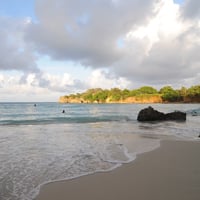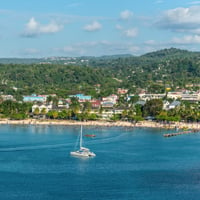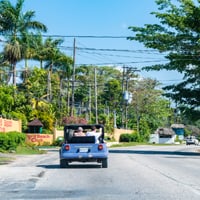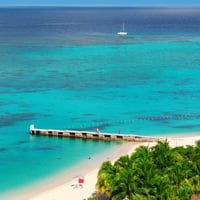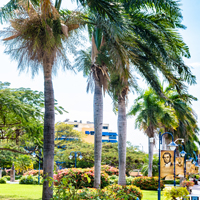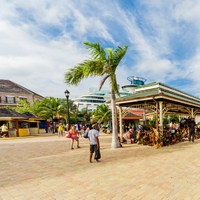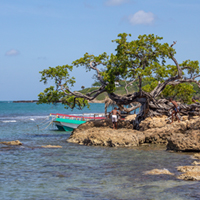Jamaica
Coastal BeachesJamaica is an island nation situated in the Caribbean Sea, known for its rich cultural heritage, vibrant music scene, and lush, diverse landscapes. It is the third-largest island of the Greater Antilles and the Caribbean, after Cuba and Hispaniola. The country's history is marked by a blend of indigenous, African, and European influences, which is reflected in its languages, customs, and cuisines. English is the official language, but Jamaican Patois is widely spoken among locals. Jamaica's economy is heavily dependent on services, with tourism being the most significant. The island is renowned for its beautiful beaches, clear waters, and all-inclusive resorts, which attract visitors from around the world. The Blue Mountains, the longest mountain range in Jamaica, are famous for their coffee plantations and breathtaking views. The capital, Kingston, is the largest city and the cultural and economic hub of the island. Jamaica is also known for being the birthplace of reggae music, with Bob Marley being its most iconic figure. The country's climate is tropical, with hot and humid weather, although the higher inland regions are more temperate. Jamaica's biodiversity includes a wide array of endemic species, particularly birds and reptiles, making it a significant ecological hotspot. The island's cuisine, with dishes like jerk chicken and ackee and saltfish, is another aspect of its cultural wealth. Despite its small size, Jamaica has a strong global presence, thanks to its influential culture and athletic prowess, especially in track and field events.
 SJB Global
SJB GlobalConnect
SJB-Global is a top-rated financial advisory firm specializing in expat financial advice worldwide, offering retirement planning & tax-efficient solutions with a regressive fee model. Our clients benefit from their country’s most favorable tax environment by utilizing the efficient investment vehicles we offer. Our commitment to quality service is reflected in our stellar reviews, with over 300 testimonials boasting 95% five-star ratings.
Click connect to have our partner contact you via e-mail and/or phone.
 SJB Global
SJB GlobalSJB-Global is a top-rated financial advisory firm specializing in expat financial advice worldwide, offering retirement planning & tax-efficient solutions with a regressive fee model. Our clients benefit from their country’s most favorable tax environment by utilizing the efficient investment vehicles we offer. Our commitment to quality service is reflected in our stellar reviews, with over 300 testimonials boasting 95% five-star ratings.
Connect
Click connect to have our partner contact you via e-mail and/or phone.
Living in Jamaica
Best Places to Live in Jamaica
Visa & Residency
Obtaining a residency in Jamaica for expatriates can be an average challenge, depending on the type of visa and the individual's circumstances. The most common types of residency visas include the Work Permit and the Marriage Visa. For a Work Permit, expatriates must secure a job offer from a Jamaican company before arriving in the country. The employer is typically responsible for applying for the work permit on behalf of the expatriate. This process involves submitting a completed application form to the Ministry of Labour and Social Security, along with various documents, such as a police record, passport photographs, and proof of qualifications. The processing time can vary, and the permit is usually granted for a period of one year but can be extended upon application. The Marriage Visa is applicable to those who are married to a Jamaican citizen. To apply, the expatriate must provide a marriage certificate, a valid passport, and proof of financial support, among other documents. The application is submitted to the Passport, and Citizenship Agency (PICA) in Jamaica. Once granted, the Marriage Visa allows the expatriate to live in Jamaica and can lead to permanent residency. For digital nomads, the Work Permit is also a common option, as there is no specific 'digital nomad visa' in Jamaica. The length of stay for digital nomads will depend on the duration of the work permit issued, which can be extended if necessary. The process of obtaining a residency visa in Jamaica involves dealing with bureaucratic procedures and providing a comprehensive set of documents. It is advisable for expatriates to begin the application process well in advance of their intended move date. Additionally, hiring a local immigration or consultant can help navigate the complexities of the Jamaican immigration system. While the process is not overly difficult, it does require attention to detail and patience to ensure all requirements are met for a successful application.
Healthcare in Jamaica
Jamaica's healthcare system is a mix of public and private services. The public healthcare system is accessible to all citizens and legal residents, and it is funded by the government. Public hospitals and clinics provide a range of services, from primary care to specialized treatments, but they often face challenges such as long wait times, resource constraints, and staffing shortages. Private healthcare in Jamaica offers higher quality services with more modern facilities and shorter wait times, but it is more expensive and thus less accessible to the general population. Expats and digital nomads can access public healthcare once they have legal residence status, but many opt for private health insurance to ensure access to private hospitals and clinics. The cost of private healthcare varies depending on the services and the level of care required.
Cost of Living
The cost of living in Jamaica is considered moderate. While some goods and services can be expensive due to importation costs, local products and services are generally more affordable.
Weather
Jamaica has a tropical climate characterized by hot and humid weather, although higher inland regions are more temperate. Coastal areas of Jamaica experience the trade winds, which bring a refreshing breeze. The country has a wet season from May to November and a dry season from December to April. Hurricanes can occur from June to November.
Educational System in Jamaica
The educational system in Jamaica is structured similarly to the British model, reflecting the country's history as a former British colony. Education is highly valued, and the government provides compulsory education for children from ages 3 to 18. The system is divided into four levels: early childhood, primary, secondary, and tertiary. Early childhood education, which includes basic schools and infant schools, caters to children aged 3 to 6. Primary education starts at age 6 and continues until age 12, culminating in the Primary Exit Profile (PEP) examination, which determines placement in secondary schools. Secondary education is divided into lower school (grades 7-9) and upper school (grades 10-11), with an optional two additional years (grades 12-13) for advanced studies. Students take the Caribbean Secondary Education Certificate (CSEC) exams at the end of grade 11, and those who continue can sit for the Caribbean Advanced Proficiency Examination (CAPE) at the end of grade 13. The quality of education can vary, with some schools offering excellent resources and others facing challenges such as overcrowding and limited materials. The academic year typically starts in September and ends in July, with breaks in December and April.
Copyright 1997-2025 Burlingame Interactive, Inc.

